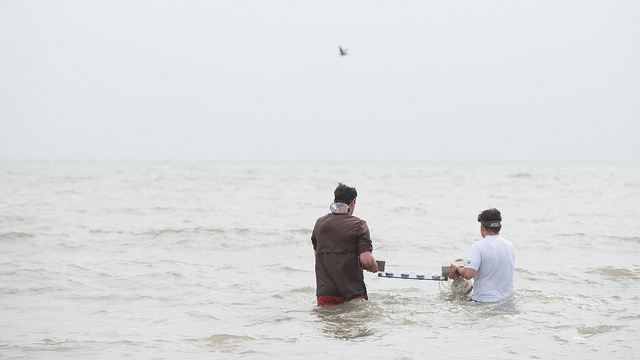Experiment Seeks to ID Plastic-Eating Microorganisms

In an experiment to identify plastic-eating microorganisms, two Texas A&M University-Corpus Christi researchers installed today, Tuesday, May 24, a platform rigged to hold 5 grams of tiny plastic pellets in the waters of Corpus Christi Bay off Cole Park.
Dr. Jeff Turner, Assistant Professor of Marine Biology, and Lee Pinnell, a Doctoral Student, designed the platform with three rows of four cylinders to contain plastic pellets. The setup allows for water to flow in and around the tiny plastic pellets but keeps them securely in place.
The two also installed a platform at the Laguna Madre Field Station.
Doctoral student Lee Pinnell(left) and assistant professor Jeff Turner of TAMU-CC place thier experiment piece into the Corpus Christi Bay. Credit: tamuccmarcom on Flickr.com
Once removed, after a month in the bay, the researchers will identify marine organisms that have colonized the plastic pellets. This is the first step to determining if marine microorganisms play a role in plastic biodegradation, Pinnell explained.
Biodegredation is the breakdown of materials by bacteria. Plastics are thought to have a slow rate of biodegradation, lasting for hundreds of years in the marine environment and breaking down into smaller microplastics.
In addition to being unsightly, plastic in the marine environment negatively affects water quality, and is problematic for animals that may mistake floating plastic for food, giving them bellyfuls of plastic with no nutritional value.
Turner and Pinnell have scheduled a longer, 15-month study at the Laguna Madre site to determine the amount of biodegradation using 15 such platforms.

